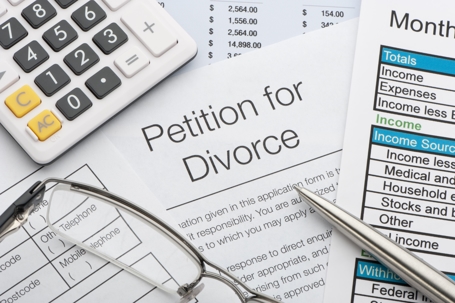Unfortunately, some individuals can face many legal battles at one time. It is not uncommon for those entering a divorce to also be faced with bankruptcy proceedings. If you find yourself in this scenario, contact an Orlando Divorce Attorney to discuss your options moving forward and what is the best approach for your specific situation.
One of the first items to determine is how bankruptcy law and family law interact. One unique feature to bankruptcy law is the specific mention of family law proceedings. The likely reason for the specific mention of this form of law is that divorce is a common reason cited for bankruptcy filings. When you file for bankruptcy, there is generally an automatic stay of all other pending lawsuits you are involved in. However, bankruptcy code specifically allows for a debtor to initiate a divorce action or continue with the proceeding during the pendency of the bankruptcy action. However, the automatic stay is still applied to your property and assets. Therefore, the divorce proceedings will not be able to conclude until the bankruptcy proceeding does; or it provides permission for the domestic relations judge to engage in the equitable distribution of assets. In most cases, the bankruptcy case must fully conclude before the divorce action can close as the court must make an equitable distribution of the remaining assets and liabilities.
If you choose to file for a chapter 7 bankruptcy prior to your divorce, this may aid the divorce process as some debts may be discharged and simplify some issues in the divorce proceeding; you may share the costs of the bankruptcy action with your spouse; or joint debts or contracts may be dissolved leaving you in a better position for your divorce action. However, some couples do not qualify for a chapter 7 and must file a chapter 13 bankruptcy action, which could include a lengthy process and only reorganization of the debts. You may wish to wait to file for bankruptcy till you are divorced in order to qualify for a chapter 7 bankruptcy, to remove certain assets or debts your name, or protect certain assets from creditors.
It is important to remember that if you do file for bankruptcy after a divorce, no child support or alimony debts will be discharged. The debtor is specifically required under the bankruptcy code to pay these obligations in full and contempt actions may still be brought against you for failure to make these payments during a bankruptcy proceeding. Therefore, if you are seeking to circumvent a divorce court order and remove these obligations through a bankruptcy proceeding, you will fail to achieve this goal.
If you are facing a divorce and bankruptcy, it is important to discuss this with your Orlando Divorce Attorney. It may be prudent to seek one action first, and hold on the other or you may be able to move forward with both at the same time. Be forthcoming and discuss your options and concerns with your Orlando Divorce Attorney to develop a strategy that focuses on your needs and rights.
Speaking to an attorney at our Orlando office is free of charge, and we accept calls 24 hours a day, 7 days a week. Contact us at 407-512-0887 or complete an online contact form to get in touch with a member of our team today.

